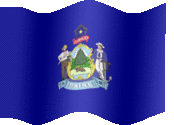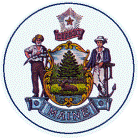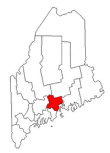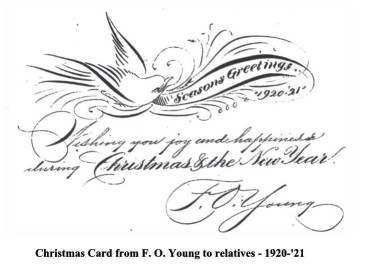Lincolnville,
Maine was home to a multi-talented man,
who made his way to San Francisco when it
was a fledgling city. Much of the
biography of Frederick Osborne Young,
commonly called F. O. Young, was written
in his own words, in letters that he wrote
to relatives, newspaper clippings as told
to reporters, and in pages of his diaries
of 1922, which were in the possession of a
relative, Gus Ossman. F. O. Young’s
life story has been written about in
Lincolnville Historical Society’s
publications, and in the Young
Genealogical Workbook, in 1991 by
Donald L. Young, Jackie (Young) Watts and
Isabel Morse Maresh.
Yet, there are those who
have never heard of him, and how he
overcame many, many obstacles in his life.
Here is his story, much of it as
told by him:
I was born in Youngtown in
Lincolnville, Waldo County, Me. on March
13, 1852. I was the second child of
ten children of Elijah Young and Nancy
Annville Heal.
I seem to
have been born under an unlucky star as I
had many accidents in my youth. The
first was when I got lost on our
celebrated turnpike [the road from
Lincolnville to Camden, by Meguntcook
Lake]. I was about two and a half
years of age. They found me about 3
o’clock in the morning. I was found
where I had climbed up the mountain side
from the road. I was asleep on a rock and
half-dead. They had fired guns and
about given up, thinking that I might have
drowned in the pond when through a dream,
Uncle Doctor, the seventh son of Moses
Young, found me. I remember coming
to life when they were taking me home in
the wagon.
When I
was about four years old, my mother gave
me a whipping for getting inside of
Grandfather’s clock. The end of the
switch, about three-eighth-inch long, got
into my right eye, and staid there for
nine days. It hadn’t penetrated the
eye, and could have been removed if the
doctor had come, but he said to poultice
it, and it ruined my eye.
Grandfather said that he could have
pulled the piece from my eye, but Mother
was sympathetic with my pain, and wouldn’t
let him.
When I was
nearly six years of age, Father was
chopping wood in the shed. I wanted to go
out of the door beyond him. There was a
narrow space between his chopping block
and a tier of wood. I darted thru in front
of him, while his axe in the air just
missed me and took my right hand off in
the air like a twig, mitten and all.
My
Grandmother Young [Charlotte (Heal) Young]
came up, and the excitement brought on a
shock of palsy from which she died on that
day, Jan. 17, 1858. Grandfather told
me that he saved the thumb on my right
hand. Dr. Gordon had wanted to cut
it off at the wrist. Grandfather
said that it would be more than a hand to
me. He was a practical man and saved me
from failure. Without it, I would
have been poor indeed. I can pick up
a pin, button a button, in fact, those
around and working with me never notice my
disability. Doctors should be very
careful in such cases and save if possible
a remnant.
When I was
older, I was helping father build our
barn. I slipped and fell ten feet headlong
into the barn floor. It nearly broke
my neck and laid me up for a long time.
This was due to my eye, in
miscalculating distance as anyone knows
you lose the angle of the two eyes.
Try and place your finger on an
object while shutting one eye and see for
yourself. I climbed a tree fifteen
feet where I threw my right arm over a
rotten branch and fell to the rock below
which laid me up for a long time.
In chopping
down small trees, I smashed my finger
badly and the only consolation I got from
Father was: Why didn’t you keep on
chopping? Once he put the broad axe
into his foot while working in the
shipyard and he poured turpentine into the
great gash and went on hewing.
That’s the kind of men who make
things go. When I was sixteen, I was
wrestling with a man about forty pounds
heavier than I, though I threw him.
In doing it I slipped on the ice and
was lame for a year in my back.
Mother said, ‘Good enough for
you, you shouldn’t wrestle. ‘
All sports
were meat and food for me and I practiced
exercises at home so as to outstrip my
mates. Another time I was chip
chopping with a mate and my axe stuck, and
his axe nearly severed the fingers of my
left hand. The same mate stabbed me
near my juggler vein. I also had two
severe cuts from my scythe. I
knocked my big toe joint out and was lame
for three years. I wrenched my ankle
in jumping over a high wall which put me
on crutches for a time.
I was thrown
from a horse which hurt my side badly.
I dropped a pistol and was shot thru
my right arm, smashing the bone.
This wasn’t well before I thrust a
big pin into my foot. I liked to
have died from blood poison. In this
case, I had only one foot and one hand
left to help me around on my crutches.
I’ve never had a fight in my life
but always was willing to measure up with
my mates in a sportsman-like way to decide
our ability, with no desire to injure or
to be injured having grown cautious from
experience. I lay the loss of my
hand and other accidents to having lost my
eye, as I couldn’t see my danger in that
side and later was run over by a heavy
team from the same cause.
I went to
school three or four months of the year.
I worked on our small farm and
neighboring farms and in Camden until I
was about nineteen years old. I then
went to the Castine State Normal School,
where I graduated in 1874. While I
was attending this school, and afterward,
I taught winters in about sixteen towns in
ten years. I taught singing and
writing schools evenings. During
vacations I worked haying, farming,
carpentering and at any work that I could
get. The principal of the Normal School
found me proficient enough in vocal music
to give me the primary class in music.
I taught while there, earning enough
by being economical with vacation work and
teaching to pay my own way. The
first money I earned at $15. A month
with Cal Joe Fry Hall. He offered me
the money to go the school. I
thanked him for his interest in me, and
told him that I had saved money enough to
go to Castine.
During the
summer I also went mackerel fishing.
I became proficient enough to go
High line on my last two trips. My
best catch with handline was ten stave
barrels in one day, and that was in a
fourth-class berth. Eben Loveland,
our first hand, caught eleven barrels at
the same time. By working at these
different occupations I managed to get a
little money ahead, and finally, after
seeing some of Gaskell’s fine penmanship,
I went to his college at Manchester, NH.
He gave me praise, and said he said
that I had a fortune in my left hand, and
that he made as much money in advertising
me as he did from learning from his
Compendium.
After
publishing my portrait and a write-up in a
daily paper, he conceived the idea of
publishing them in his Gazette. It
was an incentive to thousands, many of
whom became prominent penmen, but I was
before them. I have outlasted nearly
all of them, and probably have done more
practical penmanship than any living man,
yes, any two ever did. None believed that
a left-handed man could do it. The
secret of it was that I used the muscle or
forearm instead of fingers. By that
means I could do the heaviest work and
still retain my writing. The leading
penmen laughed at it, but I have taught
right-handed persons with my method and
had wonderful success.
Mr. Gaskell
considered me the best left-hand writer in
the United States. He said that the
most interesting part of this writing is
that I turned the paper round until the
ruled lines are vertical, the head of the
sheet being by my right hand, then turned
the left side of my body toward the desk,
and wrote down the vertical lines toward
my body. Mr. Gaskell told a reporter
when completed, the sheet is turned round
and the letter if found in the ordinary
shape and with all the letters sloped as
if written by a right-handed person.
Mr. Young is a young gentleman of
education, and has been a successful
teacher in Maine. He unhesitatingly
declares the elegances of his penmanship
are entirely attributable to his study of
Gaskell’s Compendium. He has only
been about a week a student at the
business college.
Now after
fifty years, they are trying to teach
penmanship all over. But they don’t
get at it as I did and still do, for I can
duplicate anything done with the pen.
At seventy
years of age, I can do two hundred
diplomas in a day, what it took three of
us, A. R. Dunton, I and an assistant, to
do in two days, and I have been an invalid
for six years. I have lost eighty
pounds in weight. So much for my
practical work. I was gifted with
fine eyesight, being able to write the
Lord’s Prayer six times on a silver half
dime, which was once and eight words,
claimed to be the record by a man who used
two pair of specs.
I was also
gifted with a fine constitution from my
New England Yankee parents of which there
were none better, being able to do all
that pertained to our primitive mode of
living, having to farm, carpenter, spin,
weave, knit, cook, wash and make nearly
everything we need in the first years of
my life.
How many
times I’ve seen Mother spin till 11
o’clock at night. She always had
some work in the evening after all the
work of the day. Caring for a family
of ten children is some job. Father
was a mighty man. He never let me
sit in the corner and suck my thumb,
though I had one hand and one eye.
But he put the lash to me, and
finally I got so I could lead him in the
hay field. We need not be ashamed of
our old-fashioned New England parents.
They have produced the children who
have made this country. May the Lord
save us from producing a degenerate race,
for it is fast superseding our good old
stock, physically, mentally and
mechanically. But for our early
training among the rocks and ribs of
Maine’s hills, I never could have stood
the strain of my work and survived.
Teachers and penmen with much less
work I have seen pass out, though I was
before them at the work. I thank my
Dad for making me hoe my row and keep up
now, though I rebelled sometimes when I
was not allowed more time to play.
I also became
a sharp-shooter. Major F. O. Anderson,
Editor of The Penman’s News-Letter,
who called me the Marvel of the Ages wrote:
Mr. F. O. Young was not only a great
penman, but one of the greatest marksmen
of all times. He held the world’s
record for musket shooting, having made
459 out of 500, against the former
champion, Chris Meyer. He made 98
bull’s eyes out of 100 shots. At 200
yards offhand shooting, he has never been
equaled. Mr. Young used a
fifteen-pound Ballard rifle. He held
the world-record of The Columbia
Pistol and Rifle Club, with the fine
rifle at the Shellmound Range, where he
fired two scores and made five, and four
on the Columbia target. The latter
score had never been equaled.
As F. O.
Young grew older, he wrote to a relative:
Dear Cousin: I note your writing is
improving. My eye is growing dim.
I can see about seven inches without
specs to write and read. What an eye
I had! And so abused. It got
near-sighted and I went into long range
shooting to lengthen it and it did.
Then I had to put on glasses until
it came back to original sight. So I
put on distance specs but it is hazy and
the optician can’t fit me, so I am up
against it. But I am thankful that
it is as well as it is. Just
consider that during the past fifty-five
years I’ve written about 2,000,000 cards,
50,000 diplomas, and engrossed over 50,000
pieces besides all my letters, flourishes,
drawings, signs, etc, etc. After two
penmen who had learned from me played out,
I took their place in the Emporium and
wrote for fifteen years under a two-power
electric. I wrote the Lord’s Prayer
six times in the size of half dime,
without specs. My competitor used
two specs and wrote it four times. He
claimed the record.
Another of F. O. Young’s hobbies
was making fine violins. It seemed
that there was nothing that he could not
do. His violins, his Sharp-shooting
pistol, many, many of his penmanship
drawings are among his relatives.
Some have found their way to the
Lincolnville Historical Society, and have
been displayed at the Farnsworth Museum in
Rockland, Maine.
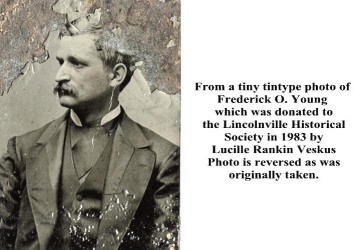
|
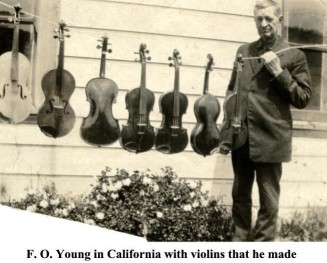
|
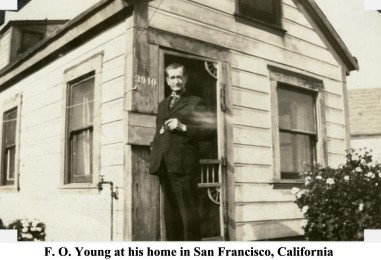
|
A
newspaper clipping titled Expert
With Pistol And Pen summed
up his life: Mr. F. O. Young, the
California representative of the
Sharpshooters Union, Newark, N.J.
is a Maine man, with one eye and
one hand. His father
accidentally chopped off his right
hand when he was a small boy and
his mother knocked his right eye
out whipping him for getting
inside his grandfather’s clock.
He never traveled on a
railroad without an accident of
some kind happening. He has
been mauled by wildcats, hugged by
bears, bitten by rattlesnakes,
thrown from bronco ponies a
hundred times, frozen so often
that he has become accustomed to
it. He was struck by
lightening and had both feet
shattered, and has been gored by a
Durham bull. Mr. Young, in
modestly relating his experience,
said he was beginning to be afraid
that something serious might
happen to him some day. Mr.
Young was one of the successful
shooting competitors and won a
gold and silver medal and numerous
other prizes. He is the
finest pistol shot on the Pacific
Coast, and is also recognized as
the champion left-handed penman of
the world.
Fred
Osborne Young died May 15, 1932 in
San Francisco, California, aged 80
years and 1 month. One
reporter wrote of him as being One
of our Lincolnville boys who now
sleeps among his kindred in the
family lot in the Youngtown
Cemetery in Lincolnville, Maine.
|
[Postscript:
Lincolnville Historical Society welcomes
contributions of any data relating to F.
O. Young, as well as other Lincolnville,
Me. Artifacts.]
|
